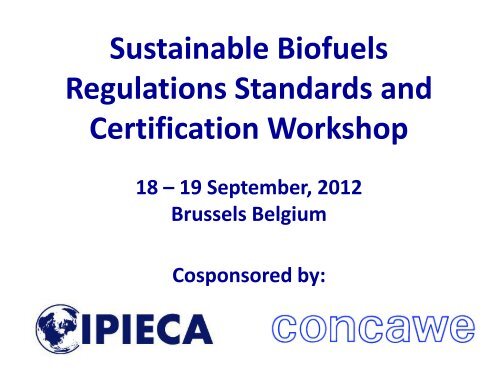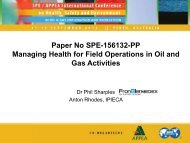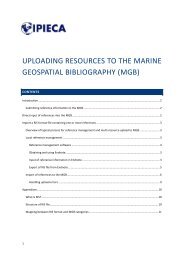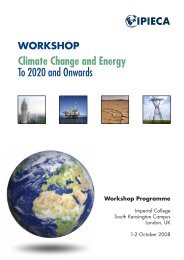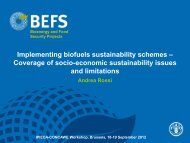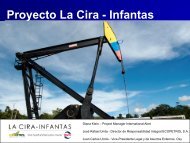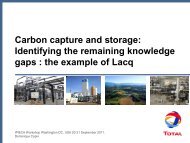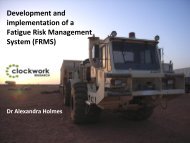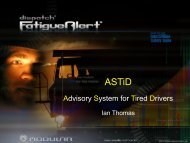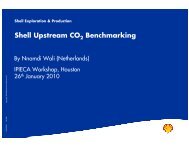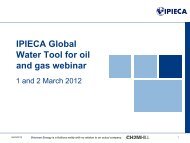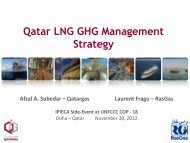Day 2 - Session 1 - IPIECA
Day 2 - Session 1 - IPIECA
Day 2 - Session 1 - IPIECA
You also want an ePaper? Increase the reach of your titles
YUMPU automatically turns print PDFs into web optimized ePapers that Google loves.
Sustainable Biofuels<br />
Regulations Standards and<br />
Certification Workshop<br />
18 – 19 September, 2012<br />
Brussels Belgium<br />
Cosponsored by:
Workshop<br />
Objective: Review the status of biofuels regulations, understand<br />
how sustainability standards are implemented, and consider how<br />
to improve standards’ effectiveness.<br />
Meeting Participants: Petroleum Companies, Biofuels Producers,<br />
Regulatory Bodies, Academics, Auto Companies, NGOs,<br />
Consultants<br />
A healthy dialogue, a status check, an opportunity to improve the<br />
industry, a chance to give feedback, a chance to reconnect with<br />
colleagues or make new contacts
Workshop: Recap <strong>Day</strong> 1<br />
• What did we learn?<br />
• What questions remain?
Workshop: Recap <strong>Day</strong> 1<br />
• Bioenergy and agriculture: today and tomorrow<br />
– Martina Otto (UNEP): Biofuels in the future of agriculture:<br />
competitive or transformational?
Workshop: Recap <strong>Day</strong> 1<br />
• Regulatory expectations for biofuel sustainability schemes<br />
– Development process, current requirements, model, and iLUC<br />
– Ignacio Vazquez Larruscain (DG Climate Action): The EU’s<br />
Renewable Energy Directive<br />
– Margo Oge (US EPA): The US Renewable Fuels Standard<br />
– Denise Green (Hart Energy): Snapshot of sustainability<br />
regulations in Australia, Brazil, California, and Japan
Workshop: Recap <strong>Day</strong> 1<br />
• Basics of biofuel certification & sustainability standards<br />
– What do they cover? How do they work? How are they similar?<br />
– Ortwin Costenoble (NEN): CEN’s sustainability standard<br />
– Hans Nordström (Swedish Standards Institute): ISO’s<br />
sustainability standard<br />
– Alain de Plaen (SynergOil): CEN and ISO compared with RED<br />
– Melanie Williams (RSB): Roundtable for Sustainable Biofuels<br />
– Gert van der Bijl (Solidaridad): Bonsucro, RSPO, and RTRS
Workshop: Recap <strong>Day</strong> 1<br />
• Implementing biofuels sustainability schemes<br />
– What works, what doesn’t and unintended consequences<br />
– Michelle Morton (Shell): Chain of custody options<br />
– Peter Smith (Cargill): Ensuring sustainability compliance in<br />
global supply chains<br />
– Kristell Guizouarn (Sofitproteol/Diester): Complying with<br />
2BSvs<br />
– Yotsawin Kukeawkasem (GIZ): Case study: RSPO producer<br />
certification<br />
– Paul Argyropoulos (US EPA): Implementing the RINs system
Workshop: Recap <strong>Day</strong> 1<br />
• Measuring the impacts of voluntary standards and<br />
certification schemes<br />
– How to measure social, environmental and economic impacts of<br />
voluntary schemes?<br />
– Kristin Komives (ISEAL): The ISEAL Code of Good Practice<br />
– Jessica Chalmers (Winrock Intl): Building capacity for<br />
monitoring compliance<br />
– Measureable impacts of voluntary standards<br />
• Mohammad Rafiq (Rainforest Alliance): On the environment<br />
• Andrea Rossi (FAO): On producers and communities
Workshop: <strong>Day</strong> 2 Looking Forward<br />
• Learning from Others: Electronics industry’s conflictfree<br />
minerals programme<br />
• Context, instruments, mechanism necessary for<br />
standards to achieve desired outcomes<br />
• Discussion:<br />
– Creating sustainable and scalable solutions<br />
• Discussion:<br />
– Workshop conclusions<br />
• EU iLUC Update<br />
• Workshop Close
Conflict Minerals:<br />
A Program in the Making<br />
[for <strong>IPIECA</strong> and CONCAWE]<br />
Bob Leet<br />
Intel Corp / EICC Extractives Co-Lead<br />
19 September 2012<br />
10
Agenda<br />
• How the conflict minerals issue was raised up to the<br />
electronics industry<br />
• Effective collaboration with multiple stakeholders –<br />
what to expect, what not to expect<br />
• Balancing supply chain complexity, regulations,<br />
reputation (company and industry perspectives)<br />
• Developing and executing an industry-wide program<br />
– a timing perspective<br />
• Success of the Conflict-Free Smelter Program, and<br />
conflict minerals due diligence tools and methods<br />
11
EICC ® Members<br />
As of 27 February 2012<br />
12
GeSI Members<br />
(As of 6 January 2012)<br />
13
Extractives WG Partners<br />
( As of September 1, 2012 )<br />
Partner Industry Associations<br />
Non-Member Partner Companies<br />
14
The Rise of the Conflict,<br />
from the DRC to Electronics Supply<br />
Mineral<br />
wealth<br />
funds<br />
bloodshed<br />
in the<br />
Congo<br />
• United Nations reports (2001, 2008<br />
and 2009) that minerals trade directly<br />
contributes to funding the war in the<br />
Congo.<br />
• “Conflict minerals” issues have<br />
become the focus of numerous nongovernmental<br />
organizations (NGO),<br />
as well as the media. Engagement<br />
with EICC & GeSI in 2007.<br />
• US legislation signed in 2010 requires<br />
US companies to disclose sources of<br />
tin, tungsten, tantalum and gold; and<br />
to conduct due diligence in their<br />
supply chain (Dodd-Frank Wall Street<br />
Reform and Consumer Protection<br />
Act)
Multi-stakeholder Collaboration<br />
• Who and why<br />
– Industry, Civil Society (Non-Government Organizations, NGOs),<br />
Government, and Investors<br />
– Stakeholders balance each others’ interests<br />
• What to expect<br />
– Each stakeholder plays a role, yet each stakeholder does not have<br />
to be engaged on each topic<br />
– NGOs come in all different flavors – advocates, implementers,<br />
opinionated, fair/unfair<br />
– NGOs and Government can bring credibility to Industry’s work,<br />
which leads to investment<br />
• What not to expect<br />
– Nobody will be coming to you with open wallets<br />
– Government needs to be educated, but still may not agree with you<br />
– Don’t expect NGOs to change their position, even though they may<br />
be friendly when working with you<br />
16
Collaboration Towards a Process Standard<br />
Smelters<br />
Electronics<br />
Industry<br />
EICC/GeSI<br />
members<br />
Metal industry<br />
associations<br />
LEADERSHIP<br />
Other<br />
Industries<br />
Non-Government<br />
Organizations<br />
Conflict Minerals<br />
efforts have been<br />
successful by<br />
multiple supply<br />
chain and external<br />
entities working<br />
together to<br />
achieve agreeable<br />
processes and<br />
tools<br />
Source: Intel<br />
17
Balancing Supply Chain Complexity,<br />
Regulations, and Reputation<br />
• Fixed: Regulation and<br />
preservation of<br />
Reputation are<br />
requirements<br />
• Variable: Companies<br />
must be creative in how<br />
they engage their<br />
suppliers<br />
• Collaborate with the<br />
Supply Chain, don’t<br />
treat them as a<br />
commodity<br />
• Peers can work together<br />
with the supply chain<br />
and not be in an antitrust<br />
situation<br />
Civil Society<br />
(Reputation)<br />
Government<br />
(Regulation)<br />
Company X<br />
Supply<br />
Chain<br />
18
Philosophy on Program Direction<br />
Quality and CSR initiatives started on these types of trajectories<br />
Company<br />
Program<br />
Developed<br />
• Passion<br />
• Motivated<br />
• Learning<br />
Industry /<br />
Sector<br />
Harmonization<br />
• Common Suppliers<br />
• Common Customers<br />
•Common Expectations<br />
• Efficiency Gains<br />
International<br />
Standards<br />
Established<br />
&<br />
Accepted<br />
We Are Here<br />
0 ~5 ~8-10<br />
Years<br />
Source: Bob Leet<br />
19
Conflict Free Smelter Program<br />
2007-2009<br />
2010<br />
Inception<br />
Researched the<br />
issue.<br />
Held first supply<br />
chain workshop &<br />
developed idea of<br />
working together<br />
on conflict<br />
minerals.<br />
Development<br />
Created Conflict-<br />
Free Smelter<br />
Program protocols.<br />
First Ta smelter<br />
compliant.<br />
Progression:<br />
• http://www.conflictfreesmelter.org<br />
• The compliant smelter/refiner lists are publically available in order to<br />
maintain credibility and transparency of the Program.<br />
• 21 refiners/smelters compliant to date<br />
2011<br />
Launch<br />
Published first<br />
compliant Ta<br />
smelter list.<br />
Published Sn, W,<br />
and Au CFS<br />
Program protocols.<br />
CFS Program<br />
recognized by<br />
OECD.<br />
2012<br />
Grow<br />
Completed first Sn<br />
and Au audits.<br />
Engaged W<br />
industry. Added 2<br />
industry assoc.<br />
and companies<br />
from other sectors.<br />
2013<br />
Grow & Maintain<br />
Continue to<br />
engage additional<br />
smelters, refiners,<br />
& industries<br />
Source: EICC-GeSI<br />
20
Concerted Efforts Lead To Key Results<br />
Effort<br />
EICC-GeSI Conflict Minerals<br />
Reporting Template<br />
EICC-GeSI Conflict-Free<br />
Smelter Program<br />
EICC-GeSI Outreach<br />
Smelter Incentive Program<br />
In Region Sourcing Initiatives<br />
International Framework<br />
Result<br />
Considered Industry Standard for identification of<br />
smelters/refiners sources<br />
•Majority of Ta industry compliant<br />
•Collaboration agreement with Au industry<br />
•Heavy discussion with some progress in Sn<br />
•little progress in W<br />
•Strong attendance at bi-annual workshops<br />
•Addition of partners outside the electronics industry<br />
Launched by RESOLVE in Q2’12 – Intel, HP, GE<br />
Foundation are founding partners<br />
•ITSCI Bag and Tag<br />
•Solutions for Hope<br />
•Public Private Alliance for Responsible Mineral Sourcing<br />
Drove industry participation in the development of the<br />
OECD Guidance<br />
Source: Intel<br />
21
What We’ve Learned<br />
Be “On the Ground”<br />
Collaborate toward common goal<br />
Drive standards for global implementation<br />
Encourage and enlist fellow travelers<br />
Help Others<br />
Source: Intel<br />
22
When and how do voluntary<br />
sustainability standards work?<br />
Gabriela Alvarez<br />
Consultant<br />
International Trade Centre<br />
Gabriela Alvarez – Sustainable Biofuels Workshop – September 2012
What is the International Trade Centre – ITC ?<br />
The UN body for design of<br />
policy recommendations to<br />
achieve economic and social<br />
development through trade and<br />
investment.<br />
The forum to negotiate<br />
multilateral trade rules, monitor<br />
their implementation and handle<br />
trade disputes<br />
ITC mission<br />
ITC works with local and regional<br />
institutions and business<br />
stakeholders to build trade capacity.<br />
“ITC, as an agency of the United Nations, enables business<br />
export success globally by providing, with partners, trade<br />
development solutions to the private sector, trade support<br />
institutions and policy-makers”<br />
Gabriela Alvarez – Sustainable Biofuels Workshop – September 2012
25<br />
What is Trade for Sustainable Development?<br />
• A partnership-based effort to provide access to comprehensive<br />
information on private voluntary standards & increase opportunities<br />
for sustainable production and trade.<br />
Who are our partners?<br />
… as well as 95 participating standards initiatives (as of September 2012).<br />
Gabriela Alvarez – Sustainable Biofuels Workshop – September 2012<br />
…
26<br />
Standards Map: @ the Crossroads of Sustainability<br />
An online database of the ITC<br />
offering information on over 75<br />
standards, codes of conduct and<br />
audit protocols addressing<br />
Responsible Sourcing and<br />
Sustainabiliy in Supply Chains<br />
applicable to 80 sectors and 200<br />
countries.<br />
Gabriela Alvarez – Sustainable Biofuels Workshop – September 2012
Data Quality Protocols<br />
Neutrality, credibility & confidentiality<br />
1. Information is entered in T4SD Global<br />
Database by ITC staff;<br />
2. External experts are mandated by ITC to<br />
quality control the information;<br />
3. Each standard organization gets an access to<br />
the database to review the data;<br />
4. Final discussions and sign-off on the data.<br />
Ownership, update & maintenance<br />
T4SD<br />
T4SD operates as a central repository of information, the data is<br />
owned by each standard and can be modified – corrected – updated at<br />
any time;<br />
Quarterly updates of information in T4SD database;<br />
Yearly full review of the information in T4SD database.<br />
Gabriela Alvarez – Sustainable Biofuels Workshop – September 2012
StandardsMap: Online Comparison Tool<br />
www.standardsmap.org<br />
28<br />
Gabriela Alvarez – Sustainable Biofuels Workshop – September 2012
StandardsMap: Online Comparison Tool<br />
www.standardsmap.org<br />
29<br />
Gabriela Alvarez – Sustainable Biofuels Workshop – September 2012
VOLUNTARY STANDARDS<br />
RESEARCH<br />
Gabriela Alvarez – Sustainable Biofuels Workshop – September 2012<br />
30
Gabriela Alvarez – Sustainable Biofuels Workshop – September 2012 31
Regulation or voluntary<br />
standards?<br />
When and how do voluntary<br />
standards work best?<br />
Gabriela Alvarez – Sustainable Biofuels Workshop – September 2012 32
The Research<br />
• Systematic Literature Review:<br />
– ‘A replicable scientific and transparent process which aims to<br />
minimize bias through exhaustive literature search of published and<br />
unpublished material, providing an audit trail of the reviewer’s<br />
decisions, procedures and conclusions’ (Cook, Mulrow and Haynes 1997).<br />
• A total of 217 documents reviewed in four parts:<br />
– Impacts of voluntary standards on value chains<br />
– Impacts of voluntary standards on producers<br />
– The interplay of public/regulatory and voluntary standards<br />
– When and how do voluntary standards work?<br />
Gabriela Alvarez – Sustainable Biofuels Workshop – September 2012<br />
33
Do voluntary standards work? Assessing their impact<br />
Easy to measure<br />
Hard to measure,<br />
Hard to attribute to specific activities<br />
Source: ISEAL, Evaluation Approaches: How it Is Being Measured, 2008<br />
Gabriela Alvarez – Sustainable Biofuels Workshop – September 2012<br />
34
Research on this field<br />
• Significant expansion of research on voluntary standards and on<br />
impact assessment<br />
• However, still many limitations:<br />
• Limiting data collection and analysis methods:<br />
• Majority of studies based on case study approach.<br />
• Minority of studies establish counterfactuals allowing for establishment of<br />
causal relationships.<br />
• Wide disparity in coverage with over-representation of:<br />
• Crops: Coffee, Cocoa, Bananas,<br />
• Certifications: Fairtrade, Organic,<br />
• Aspects: Economic<br />
• Regions: Latin America<br />
• Limited theory building work<br />
• Lack of theoretical underpinnings.<br />
• No theoretical framing of results.<br />
Gabriela Alvarez – Sustainable Biofuels Workshop – September 2012<br />
35
Impact: Voluntary standards effects in developing countries<br />
Why? ? How?<br />
Neutral or negative<br />
Positive<br />
Source: Alvarez and Von Hagen, Impact of voluntary standards on producers in developing countries,<br />
International Trade Centre, 2011<br />
Gabriela Alvarez – Sustainable Biofuels Workshop – September 2012<br />
36
A systemic view: The CIME Framework<br />
• Natural factors<br />
• Institutional conditions<br />
• Government<br />
• Voluntary standards<br />
• Regulations<br />
• Other private/public instruments<br />
• Triggered by interventions<br />
• Changes in behavior<br />
• Ex. Empowerment,<br />
relationships, etc.<br />
Gabriela Alvarez – Sustainable Biofuels Workshop – September 2012<br />
37
Context<br />
• Adoption of voluntary standards is favored in certain contexts:<br />
– High traceability requirements<br />
– Extractive businesses<br />
– Commodities are identifiable in end products<br />
– Shorter supply chains with fewer actors<br />
– Activist action<br />
Gabriela Alvarez – Sustainable Biofuels Workshop – September 2012<br />
38
Context<br />
• Positive impact of standards associated with higher levels of producer and<br />
institutional preparedness (selection bias)<br />
Cocoa production and certification<br />
Source: State of Sustainability Initiatives, 2009<br />
Gabriela Alvarez – Sustainable Biofuels Workshop – September 2012<br />
39
Context<br />
• Regulatory framework as an enhancer or deterrent of voluntary standards:<br />
– Property rights<br />
– Clear rules of engagement<br />
– Enforcement of regulations (cost to comply)<br />
Cost to<br />
comply<br />
Cost to<br />
comply<br />
Regulations<br />
Voluntary<br />
standard<br />
Enforcement of<br />
regulation<br />
Gabriela Alvarez – Sustainable Biofuels Workshop – September 2012<br />
40
Instruments<br />
• Standards need to be recognized as ‘legitimate’ by relevant stakeholders:<br />
– Inclusiveness and transparency, congruence, Balance between global scope<br />
and adaptation to local conditions, effectiveness, science supporting it<br />
• Implementation of voluntary standards is enhanced when clear and visible<br />
incentive for their adoption exist, at least in the short term.<br />
Gabriela Alvarez – Sustainable Biofuels Workshop – September 2012<br />
41
Instruments: The interplay of voluntary and regulatory<br />
standards<br />
• Voluntary standards often fill the gap where governments do not<br />
implement/enforce existing regulatory standards.<br />
• Potential regulatory action can also act as a stimulus for more aggressive<br />
voluntary standards development<br />
• Disconnected voluntary and regulatory standards create inefficiencies that<br />
can result in duplication of compliance costs, auditing and bureaucracy.<br />
• Voluntary standards perceived as legitimate by policymakers can influence<br />
regulatory action and harmonization among public and private spheres.<br />
?<br />
Gabriela Alvarez – Sustainable Biofuels Workshop – September 2012<br />
42
Mechanisms: Making it all work<br />
• Positive impacts of voluntary standards appear to be mediated by<br />
the generation of mechanisms:<br />
– Enhanced buyer-seller relationship<br />
– Producer’s increased credibility or self-assurance<br />
– Empowerment<br />
– Cross-institution relationships<br />
Gabriela Alvarez – Sustainable Biofuels Workshop – September 2012<br />
43
Mechanisms: The role of the buyer<br />
• The role of buyer is critical in determining the effect for producers and<br />
environment:<br />
Ex. Rooibos Tea in South Africa<br />
Market driven<br />
Mission driven<br />
Conventional sourcing strategy<br />
from fairtrade certified farms<br />
and cooperatives<br />
Buyer involvement and network<br />
partnerships including technical<br />
support<br />
• Limited medium term<br />
impact<br />
• Upgraded facilities<br />
• Value added /captured in source<br />
• Empowerment<br />
Source: Raynolds and Ngcwangu, Fair Trade Rooibos tea: Connecting South African producers and American consumer markets,<br />
Geoforum, 2010<br />
Gabriela Alvarez – Sustainable Biofuels Workshop – September 2012<br />
44
Summary: Ten things we have learned on voluntary<br />
standards<br />
1) Voluntary standards can result in positive effects at the producer and at the supply chain level.<br />
2) The effects of standards need to be analysed in its broader context conditions, instruments<br />
and mechanisms<br />
3) Adoption of voluntary standards is favoured in contexts where the product has high traceability<br />
requirements, in extractive businesses, when commodity is identifiable in end products.<br />
4) Voluntary standards tend to be more viable in contexts with higher levels of ‘preparedness’.<br />
5) Voluntary standards need to be recognized as ‘legitimate’ by key stakeholders, both in terms<br />
of inputs as well as outputs.<br />
6) Successful implementation of voluntary standards requires a balance between global scope<br />
and adaptation to local conditions.<br />
7) The implementation of voluntary standards is enhanced when clear and visible incentives for<br />
their adoption exist, at least in the short term.<br />
8) The role of the buyer is critical in determining the outcomes for producers, with positive<br />
impacts often being associated with mission-driven buyers.<br />
9) Positive effects for producers participating in voluntary standards are mediated by generation<br />
of mechanisms such as empowerment, buyer-seller relationships and increased credibility.<br />
10) There is a need to take a more systemic view of voluntary standards, assessing the factors<br />
that influence their effectiveness at a single point in time as well as over time.<br />
Gabriela Alvarez – Sustainable Biofuels Workshop – September 2012<br />
45
Thank you!<br />
Gabriela Alvarez<br />
galvarez@intracen.org<br />
alvarez@latitudeglobal.com<br />
Gabriela Alvarez – Sustainable Biofuels Workshop – September 2012<br />
46


